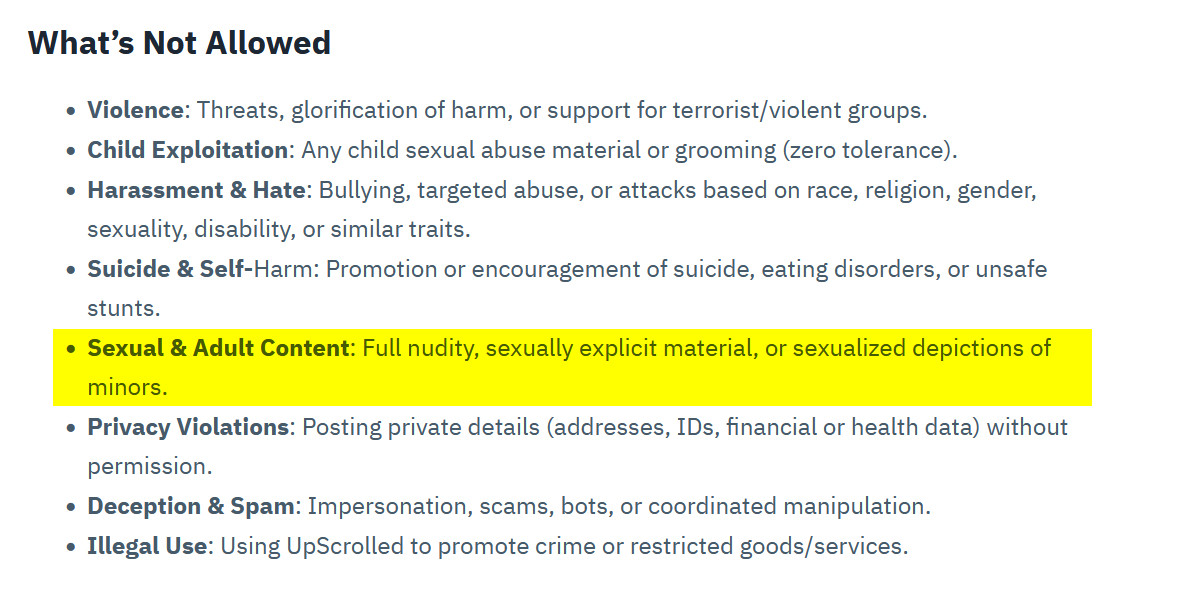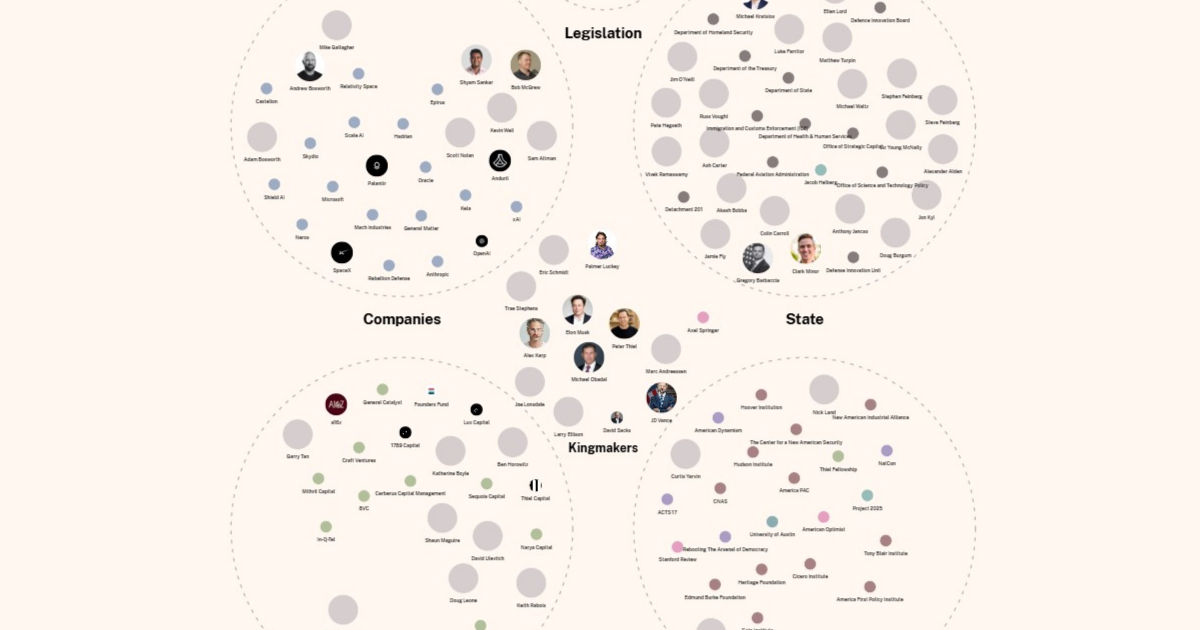alyaza [they/she]
internet gryphon. admin of Beehaw, mostly publicly interacting with people. nonbinary. they/she
- 281 Posts
- 158 Comments

 8·8 days ago
8·8 days agothey’re actually more overzealous in terms of policy about nudity and sexualized material than basically any alternative


 25·8 days ago
25·8 days agoIt’s so common for “anti-censorship” to be code for “Nazi-friendly” that I’m immediately suspicious of any platform that uses that as a selling point.
i don’t know if it’s a function of the ideological bent or just because the gigantic influx of users has totally swamped their moderation, but yes it does have problems with fascists as of writing

 3·10 days ago
3·10 days agooh, this is probably just because of the national strike day people are observing–it’ll be back up tomorrow

 55·3 months ago
55·3 months agoplease continue to “device hoard” folks

 16·3 months ago
16·3 months agogiven that OpenAI has a vested interest in downplaying the severity of this problem (especially relative to its total number of users) i’d treat this as a lower bound of the scale of this exists at–pretty bad!

 90·4 months ago
90·4 months agothere’s some real deadpan gold in this one, such as the immaculate:
How do you feel about becoming a political lightning rod?
People occasionally just flip [me] off or whatever, but nobody’s come up to me and tried to make a statement about anything. Personally, it’s kind of dumb. It’s just a vehicle. So it’s ironic that it would even become a political statement, but nonetheless it is. [Editor’s note: Taylor was arrested and pleaded guilty to conspiracy to obstruct an official proceeding in the January 6 attack on the Capitol. He was later pardoned by President Trump.]

 21·8 months ago
21·8 months agosomeone on Bluesky analogized what is happening to how QAnon transpired for most people, which is that the crazification it was causing simmered under the surface until January 6, when it all publicly exploded and the influence it had over a non-trivial block of the population became undeniable. hard to disagree with that!

 26·9 months ago
26·9 months agojust a nightmarish headline. get these two the fuck out of here

 192·9 months ago
192·9 months agoArt rock legend Brian Eno has called on Microsoft to sever its ties with the government of Israel, saying the company’s provision of cloud and AI services to Israel’s Ministry of Defense “support a regime that is engaged in actions described by leading legal scholars and human rights organizations, the United Nations experts, and increasing numbers of governments from around the world, as genocidal.”
Eno’s connection with Microsoft goes back 30 years—he composed the famous boot-up jingle for Windows 95 that was recently inducted into the National Recording Registry at the US Library of Congress.
“I gladly took on the project as a creative challenge and enjoyed the interaction with my contacts at the company,” Eno wrote in an open letter posted to Instagram (via Stereogum). “I never would have believed that the same company could one day be implicated in the machinery of oppression and war.”
Regardless, Eno clearly isn’t interested in Microsoft’s protestations of innocence: “Selling and facilitating advanced AI and cloud services to a government engaged in systematic ethnic cleansing is not ‘business as usual’. It is complicity. If you knowingly build systems that can enable war crimes, you inevitably become complicit in those crimes.”

 13·9 months ago
13·9 months agoYou can post articles critical of the US, EU, Australian or any other government, but if you post a China-critical text you are whatabouted to death.
this will be a blunt comment. people would have no problem if you were doing this, but just in a quick scan, something like 10 of your last 15 submissions on our instance (Beehaw) are you obsessively posting about China–often from sources that are straight up fearmongering and/or guilty of doing literally the same thing they’re complaining China is doing. one of the most egregious submissions you’ve made in this vein is quite literally from the House Select Committee on China, as if the American government’s committee on “competition with the United States” doesn’t obviously have a vested interest in portraying things China does in the most uncharitable light possible (much as China would for America).
separately, and in a Beehaw context: at least from our userbase, you will largely not find disagreement that China is bad–nobody here really needs to be proselytized to the fact that China is an authoritarian capitalist country guilty of acts of imperialism against their neighbors, and probably of ethnic cleansing and genocide in Xinjiang. in fact, partially because of our political disagreements in that space, we do not federate with many of the Lemmy instances you might characterize as “pro-China.” this fact makes it incredibly conspicuous when someone like yourself obsessively posts every neurosis a Western country has about China on our instance. we’ve had a pattern of several users doing this in the past year or so–and at this point it’s blatantly propagandistic and Sinophobic bullshit we’re just not interested in letting people use our instance for.
even if you aren’t doing this for propagandistic reasons, though, and just think you need to push back against pro-China campists on Lemmy or whatever: this is also not your personal anti-China dumping ground, nor is it a place for you to shadowbox with campists who think China is cool. if you are genuinely posting in good faith: diversify your submissions and, if you don’t, at least drop the persecution complex when people push back on your voluminous China posting; if this is just using us as some middle-man in a bigger thing: going forward we’re going to aggressively prune these types of post.

 2·10 months ago
2·10 months agothe website for it is pretty comprehensive as far as i can tell

 22·10 months ago
22·10 months agothis strikes me as a fascinating idea–with a couple of eyebrow-raising backers–that is probably going to flop spectacularly because it’s too minimalistic to the point of just being cheapskate

 6·10 months ago
6·10 months agoFYI: we’ve banned this user because after communicating our disinterest in being used as an anti-China dumping ground to shadowbox with people who can’t even see our instance, the user responded with a bunch of hostility about people pushing back on them.

 18·10 months ago
18·10 months agoyeah, no shit, that’s not the same as “your entire company being predicated on the unpaid labor of children who you also let do whatever they want without supervision or actually working filtering features”–not least because you could actually get banned for both of the things i mentioned from 2010, while what’s happening now is explicitly enabled by Roblox as their business model and an externality of doing business. as has been demonstrated by recent investigations into how they work down, they basically don’t have a company without systematically exploiting children

 24·10 months ago
24·10 months agoit’s been very strange to watch this game i grew up on–pretty innocuously, i should note–gradually morph into one of the most exploitative, undignifying, generally dangerous spaces for children online. the worst stuff i got into on Roblox in 2010 was online dating and learning about 4chan. now the company seems to openly revel in exploiting the labor of children and ripping them off

 6·11 months ago
6·11 months agoThen we slap a random-ass speed limit sign down and say “job’s done.”
we don’t actually–the basis we derive most speed limits from is actually much worse, if you can believe that. from Killed by a Traffic Engineer:
Traffic engineers use what we call the 85th percentile speed. The 85th percentile speed is whatever speed 85 percent of drivers are traveling slower than. If we have 100 drivers on the road and rank them in order from fastest to slowest, the 15th fastest driver would give us our 85th percentile speed.
Traffic engineers will then look 5 mph faster and 5 mph slower to see what percentage of drivers fall into different 10 mph ranges. According to David Solomon and his curves, the magnitude of the speed range doesn’t matter as long as we get as many drivers as possible into that 10 mph range.
and, as applied to the example of the Legacy Parkway, to show how this invariably spirals out of control:
North of Salt Lake City, the Legacy Parkway parallels Interstate 15 up to the Wasatch Weave interchange where these highways come together. It’s a four-lane, controlled-access highway with a wide, grassy median and more than its fair share of safety problems.
So how did the Utah Department of Transportation (UDOT) respond?
It increased the speed limit from 55 mph to 65 mph. It said the speed limit jump will “eliminate the safety risk” on the Legacy Parkway.
UDOT conducted speed studies up and down the Legacy Parkway. It found that most drivers were going much faster than the 55 mph speed limit. Channeling the ghost of traffic engineers past, the safety director for UDOT said, “We decided to raise the speed limit to a speed that is closer to what drivers are actually driving. In doing so, we hope to eliminate the safety risk of speed discrepancy, which can happen when you have a significant difference between the speed most drivers are actually traveling and those who are driving the posted speed limit.”
In the case of the Legacy Parkway, the 85th percentile speeds ranged from 65 mph to 75 mph. Based on that and what it deems engineering judgment, UDOT originally proposed raising the speed limit to 70 mph. After community pushback, it settled for 65 mph.
According to the Manual on Uniform Traffic Control Devices (MUTCD), this slight adjustment is acceptable. The MUTCD specifies that speed limits “should be within 5 mph of the 85th percentile speed of free-flowing traffic.”

 12·11 months ago
12·11 months agoExcept it’s likely on purpose so they won’t have enough people to look into this and other large cases against corporations that might impact the people buying out the government.
this is exactly what has happened; previously, the FTC was aggressively pursuing anti-trust against Amazon, Google, etc.

 3·11 months ago
3·11 months agoIsnt nigeria basically the only african country right now that isnt a shithole right now?
Nigeria probably has the most theoretical wealth available to it of any African country because it’s super rich in oil, but there are definitely other countries that have it better than Nigeria (South Africa, Cape Verde, maybe Namibia or Kenya if you want some deeper cuts). Nigeria also has a metric fuck ton of problems (religious tension and sectarianism, terrorism, an openly corrupt political system which likely stole the last presidential election, and constant economic turmoil) that severely rob its capability to exploit its riches. and yes colonialism is a big part of that, it has fairly bad deals with major corporations to exploit that oil





















see also the coverage this has gotten in NPR: